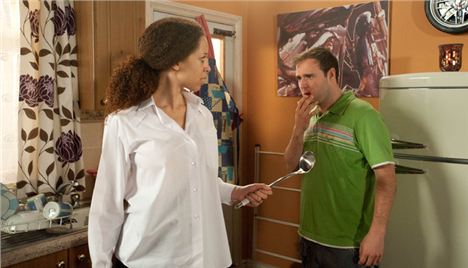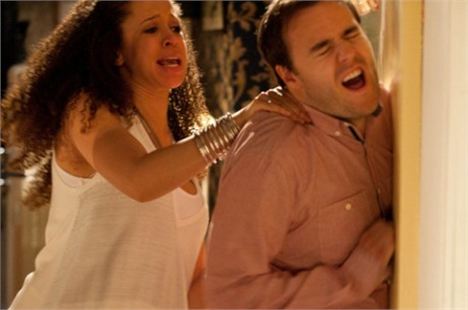A CURRENT Coronation Street storyline has been gathering more attention than usual for its depiction of domestic violence. This is because the attacks are being perpetrated against a man.
The debate instigated by the steadily building narrative of abuse between Kirsty and Tyrone (played by Natalie Gumede and Alan Halsall) has proven that the issue has resonance far beyond Weatherfield.
The very mention of men suffering physical abuse at the hands of women inspires a strange and varied mixture of emotions. After seeing his situation being replayed on screen, Ian McNicholl chose to contact Coronation Street to share his insight with the cast.
Mankind, the charity dedicated to helping males living with abusive partners, has had to install an extra phone line since advertising their helpline at the end of the Coronation Street episodes.
This prompted much online debate and revealed, as internet comments often do, a plethora of prejudices, misconceptions and outright misguided hatred.
Some remarks about the soap’s plot are ridiculous enough to pass as jokes - ‘I wish she'd get me in an arm lock, she's hot’ being a shining example. Most, however, are less humorous and follow the rough template of ‘grow some bollocks and bang her back’.
Apparently, for a significant section of the internet, punching a woman is the only way to redress the balance of masculinity after receiving a ladle to the head from your pregnant partner.
More enlightening were the large numbers of people who took to internet boards to praise the show’s decision to run with the storyline and voiced the need for more attention to be given to the subject. Some have even come forward as victims themselves: ‘there are enough men suffering (sic) from DV and not much is done for me because women are seen as the 'victims'.'
Trawling through various soap sites the extent of the problem becomes clearer, as do the various factors which culminate to reinforce the stigma associated with female on male violence. Some soap lovers were unaware the issue even existed; comments dismissing the plot for being beyond belief and ‘insulting to viewer’s intelligence’ were plentiful.
As Alan Halsall stated after meeting McNicholl, ‘Even if there was someone in your life who has suffered from it, you wouldn’t really know because it isn’t talked about.’
The disparity between awareness of the issue and the Home Office figures on domestic abuse (which state one in six men will suffer at the hands of their partners) show how much needs to change in people’s perceptions and attitudes before this issue can be approached in any productive way.
Although Coronation Street’s depiction of this problem may not be subtle or groundbreaking (day time soap Doctors has recently portrayed a similarly violent relationship), the effect the programme has had in raising the profile of the issue is remarkable.
Mankind, the charity dedicated to helping males living with abusive partners, has had to install an extra phone line since advertising their helpline at the end of the Coronation Street episodes.
This highlights the strange social power soap operas possess. Despite the erratic acting and farfetched plots which characterise the genre, their position before the watershed and their solid and large audiences provide them with a platform from which to raise important social concerns.
This, coupled with the affinity viewers feel for longstanding characters, creates a perfect method through which to naturalise difficult issues. Colin and Barry’s gay kiss on EastEnders in 1987 is one prominent example and one that illustrates how changes in perceptions can be facilitated through exposing people to things beyond their experience.
Kirsty and Tyrone’s relationship in Coronation Street may continue on its downward trajectory, but the good their storyline has done for male victims of abuse is something to be celebrated. In the future, as soap writers look for more material, we may hope that more ignored and misunderstood issues become subjects for public discussion.
Follow Alex on Twitter @AlH_HlA













